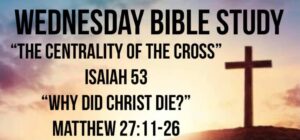“The Cross” - Written by John Stott
THE CENTRALITY OF THE CROSS
 “No theology is genuinely Christian that does not arise from and focus on the cross. The cross is at the center of the historic biblical faith, and the fact that this is not always everywhere acknowledged is sufficient justification for preserving a distinctive evangelical testimony. Evangelical Christians believe that in and through Christ crucified, God substituted himself for us and bore our sins, dying in our place the death we deserved to die, in order that we might be restored to his favor and adopted into his family.” - John Stott
“No theology is genuinely Christian that does not arise from and focus on the cross. The cross is at the center of the historic biblical faith, and the fact that this is not always everywhere acknowledged is sufficient justification for preserving a distinctive evangelical testimony. Evangelical Christians believe that in and through Christ crucified, God substituted himself for us and bore our sins, dying in our place the death we deserved to die, in order that we might be restored to his favor and adopted into his family.” - John Stott
Although Isaiah 53 doesn’t mention the cross, why would Stott use this passage “The Suffering Servant” to illustrate the centrality of the cross?
How does the servant (Isaiah53:1-3) compare to what the Jewish people were expecting in a Messiah? Think of Palm Sunday. In verses 4-6, what does the servant accomplish for mankind (us)?
Notice how Isaiah uses the sheep metaphor in verses 6-7. Look for the difference between verses 6-7. Notice how Isaiah’s writing changes in verses 10-12. What purposes are fulfilled by the suffering servant?
WHY DID CHRIST DIE?
In Matthew 27:11-26, we discover why Christ died. Two obvious answers come to mind. It was part of God’s plan for our salvation, but it was also at the hands of evil men. Stott suggests we look at three moral failings of greed, envy, and cowardice. In Matthew 27, consider how these affected the sentencing of Jesus. Consider Pilate, the chief priest, and the crowd. What were the motives of each?
Verse 19 tells us Pilate’s wife warned him to have nothing to do with this righteous man, yet he gave in to his fears. Do we sometimes act the same way?
Pilate washed his hands of the matter. The people asked for Barabbas to be released and declared that Jesus’ blood would be on them. Is there a sense in which Jesus’ blood is on all of us? Without the cross, there would be no Christian faith.
- Pastor John